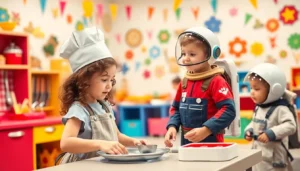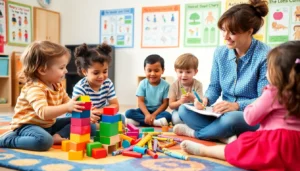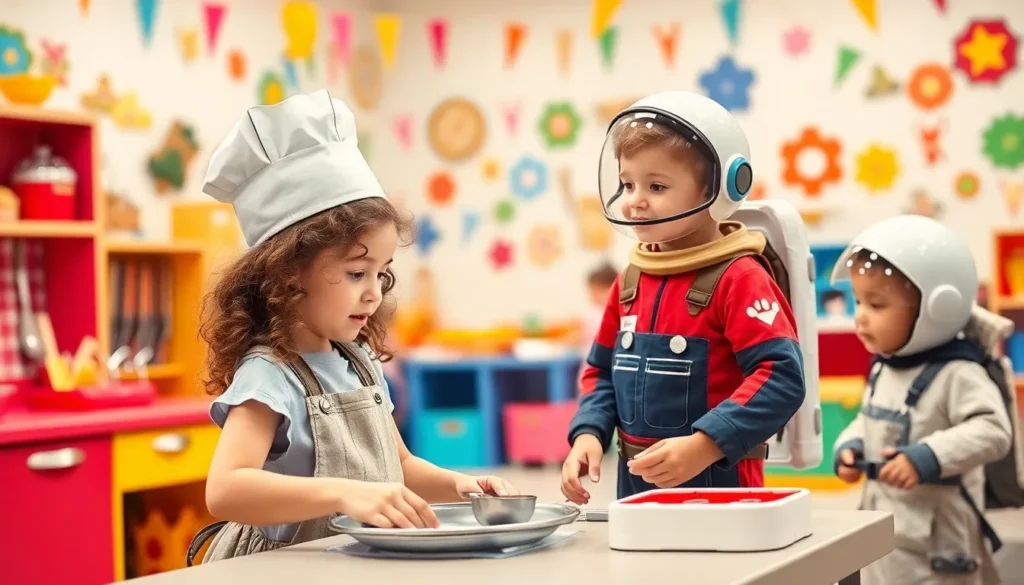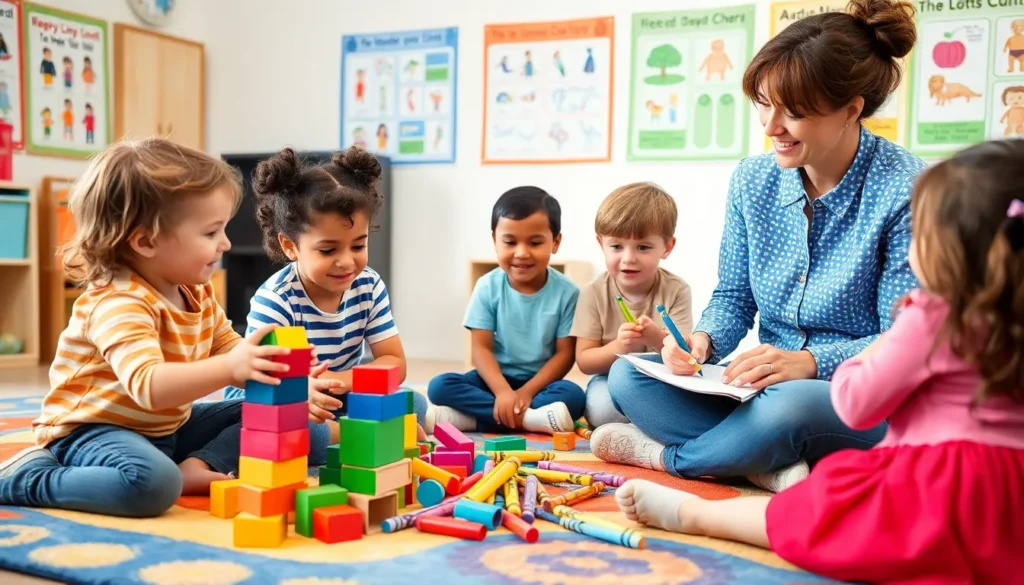Table of Contents
ToggleIn the world of early childhood education, play isn’t just a fun distraction—it’s the secret sauce for learning. Picture this: a room full of giggling children, building towers with blocks and concocting wild stories with their toys. While it looks like pure fun, these playful activities are laying the groundwork for critical skills.
Learning through play transforms the classroom into a vibrant playground of discovery. Kids engage their imaginations, develop social skills, and even sneak in some math and science—all while having a blast. So, why not swap the boring worksheets for a colorful world where learning feels like an adventure? Dive into the magic of play-based learning and see how it shapes young minds, one joyful moment at a time.
Importance Of Learning Through Play In Early Childhood Education
Learning through play plays a crucial role in early childhood education. It enhances cognitive, social, and emotional development. Children explore concepts such as teamwork, sharing, and problem-solving during playtime. Engaging in imaginative activities like building blocks or storytelling supports their creativity and critical thinking skills.
Studies show that play-based learning leads to better academic outcomes. For instance, children who participate in play-based curriculum demonstrate improved skills in mathematics and literacy. They develop a deeper understanding of complex subjects because they gain hands-on experience.
Additionally, play fosters social interaction among children. As they collaborate on projects, they learn to communicate effectively and express their feelings. Children develop empathy and emotional intelligence through these interactions, which are vital in forming meaningful relationships.
Parents and educators recognize that traditional educational methods may not be as effective as play-based approaches. Replacing worksheets with playful, engaging activities captures children’s attention and makes learning enjoyable. In this setting, children are more likely to take risks, ask questions, and explore their surroundings.
Cognitive skills also benefit significantly from learning through play. Activities that encourage exploration boost brain development, enhancing memory and problem-solving abilities. When children play, they construct knowledge, making connections that solidify their understanding of the world.
Ultimately, incorporating play into early childhood education creates a nurturing environment. It allows for exploration, creativity, and relationship-building, all of which are key to children’s success. Emphasizing play ensures a comprehensive learning experience that prepares children for future challenges.
Types Of Play In Early Childhood Education
Understanding various types of play in early childhood education reveals their essential roles in learning. Each type of play offers unique benefits that support children’s growth.
Free Play
Free play allows children to explore their environment freely. It encourages creativity and self-directed learning. During free play, kids choose their activities, which fosters independence and decision-making skills. They might engage in imaginative scenarios, build structures, or interact with peers. This autonomy enhances their ability to think critically and solve problems. Research indicates that free play contributes significantly to social skills and emotional regulation. Children learn cooperation, empathy, and negotiation through unstructured interactions. Overall, free play serves as a foundation for holistic development in early learners.
Guided Play
Guided play involves adult participation to enhance learning experiences. This type of play integrates educational objectives without losing the spontaneity of play. Educators or caregivers can introduce specific concepts during guided play while allowing children to take the lead. For instance, an adult might suggest building towers to explore concepts of balance and gravity. Through this interaction, children gain valuable insights and feedback. Studies show that guided play leads to improved engagement and retention of knowledge. It balances freedom with structure, promoting both cognitive growth and social development. By blending guidance with play, educators create rich learning environments that empower young learners.
Benefits Of Learning Through Play
Learning through play promotes essential skills in early childhood education. This approach supports both cognitive and social development, yielding significant benefits for young learners.
Cognitive Development
Play provides rich opportunities for cognitive growth. Through activities like building blocks or solving puzzles, children engage in critical thinking, problem-solving, and creativity. Research shows that play-based learning enhances early math and literacy skills through hands-on experiences. Engaging in imaginative scenarios, children develop their ability to think abstractly and recognize patterns. These experiences lay the foundation for future academic success, making it easier for children to grasp complex concepts later on. Incorporating play into learning environments fosters curiosity, allowing children to discover and explore new ideas actively.
Social Skills Enhancement
Social interaction flourishes during play. Children learn to communicate with peers, negotiate roles, and collaborate effectively. Participating in group activities helps kids develop empathy and emotional intelligence as they navigate different social situations. Skills such as sharing, taking turns, and resolving conflicts emerge naturally during playtime. Observations indicate that children involved in play-based learning exhibit stronger interpersonal skills compared to those in traditional settings. Play fosters a sense of belonging and community, essential for building lasting friendships and supporting emotional well-being. By prioritizing play, educators create dynamic learning environments that enhance social skills and relationship-building.
Challenges To Implementing Play-Based Learning
Implementing play-based learning in early childhood education presents several challenges that educators must navigate.
Curriculum Constraints
Many educational systems adhere strictly to established curricula, often prioritizing standardized testing over play-based methods. Restrictive standards may limit educators’ ability to incorporate play effectively. These constraints can hinder creative lesson planning, resulting in diminished opportunities for child-led exploration. When curriculum demands overshadow flexible learning approaches, children’s engagement and overall development may suffer. Adapting existing curricula to integrate play requires collaboration among educators, administrators, and policymakers.
Teacher Training
Proper training is crucial for educators to facilitate play-based learning successfully. Many teachers lack the skills and knowledge to implement these methods effectively. Educators must understand the principles of play and how to incorporate them into daily activities. Professional development opportunities focusing on play-based strategies can enhance teachers’ confidence and effectiveness. When teachers receive adequate training, they can create enriching environments that support children’s growth through play. Effective training programs emphasize the importance of play in cognitive, social, and emotional development, ensuring teachers are well-prepared for this approach.
Embracing play in early childhood education transforms learning into an engaging and dynamic process. By prioritizing play-based methods, educators can unlock children’s potential while fostering critical skills necessary for future success. The benefits of play extend beyond academics, nurturing social and emotional growth that shapes well-rounded individuals.
As awareness of these advantages grows, it’s essential for parents and educators to advocate for play as a central component of learning. Overcoming challenges in curriculum design and teacher training will pave the way for richer educational experiences. Ultimately, integrating play into early learning environments not only captivates children’s interest but also lays a strong foundation for lifelong learning and development.










